Thanks to Our Volunteers! – July 2025 Community Wildlife Chapter Updates
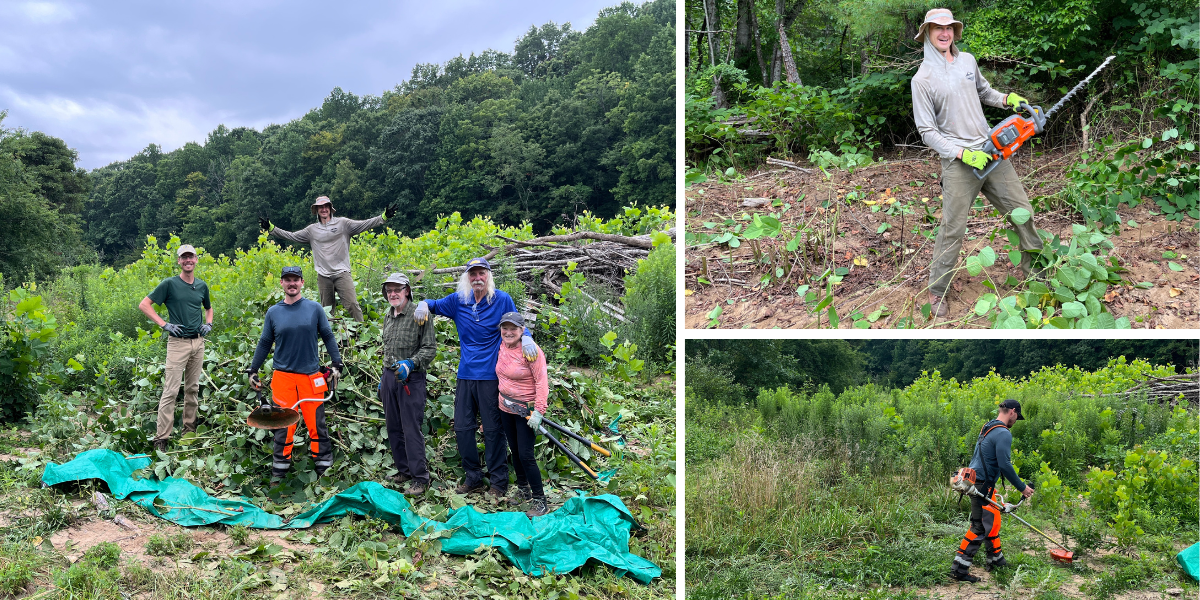
North Carolina Wildlife Federation staff and Community Wildlife Chapter volunteers embraced the heat throughout the month of July. They connected people to the outdoors with a variety of wildlife and habitat opportunities. Wildlife scavenger hunting, moth identifying, dragonfly detecting, bat surveying, nature walking, community building, and much more! In July, 783 people were given the opportunity to connect with nature through one of NCWF’s 30 events! This month from the mountains to the sea, 3,700 lbs of litter were removed from the landscape along with multiple workdays that focused on invasive species removal. Kids and adults across the state were given the opportunity to go outside, connect with nature, and learn about all things wildlife and habitat. Big thanks to our NCWF Community Wildlife Chapters and amazing conservation partners for making this work possible. Is it just us or is anybody else excited for some cooler weather and fall planting season!
Thanks to partners such as the Duke Energy Foundation, Jandy Ammons Foundation, and Burt’s Bees for helping make these habitat restoration workdays, educational programs and nature outings possible. Explore our Events Calendar to discover where NCWF and our Community Wildlife Chapters are hosting in-person and virtual events near you. Check out a few highlights below from our conservation outreach team.
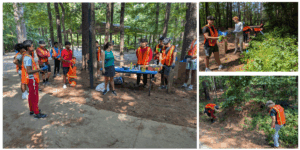
June 28, SWC SWANEC Invasive Removal at Apex Community Park: NCWF South Wake Conservationists Chapter helped high school students from SWANEC, South Wake Area Native Ecosystem Conservation, with an invasive plant removal at Apex Community Park. Volunteers focused on removing Japanese stiltgrass from the park one handful at a time.
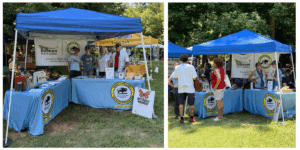
July 4-5, DWS Eno Fest: NCWF Durham Wildlife Stewards Chapter tabled at the 46th Annual Festival for the Eno. The chapter braved the heat and handed out free mosquito dunk kits and Butterfly Highway Seed Mix. They also engaged with community members about NCWF’s Butterfly Highway Program, DWS, and the ecological importance of their chapter symbol – the Green Anole!
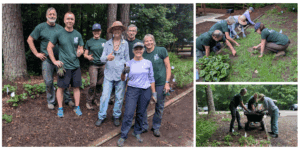
July 6, Bass Lake Native Garden Tune Up: NCWF South Wake Conservationists Chapter showed up this holiday weekend to do some maintenance on the native shade educational garden at Bass Lake Park in Holly Springs. A dedicated group of helpers weeded and mulched the garden to prepare the area for some additional native plants this fall.
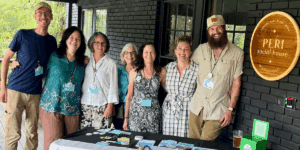
July 10, Swannanoa Valley WILD! Social & Fundraiser. SVW Chapter of NCWF brought the community together to Peri Social House in Black Mountain. Folks enjoyed pizza and drinks while learning about the new chapter and their work to protect, conserve, and restore wildlife and habitat. The event inspired new chapter supporters while also raising funds for chapter projects.
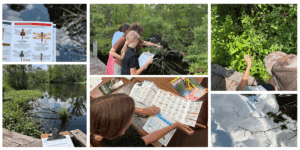
July 12, ecoEXPLORE Dragonfly Detectives: NCWF and Pocosin Lakes NWR hosted this month’s ecoEXPLORE program dedicated to entomology, and more specifically, dragonflies! ecoEXPLORErs and their families hiked the Scuppernong River Boardwalk trail in search of dragonflies and kept track of the different species they found while making observations about their behavior and habitat.
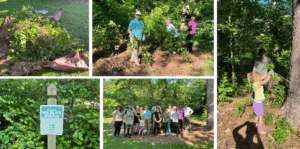
July 12, CWA Pollinator Garden Workday: NCWF Concord Wildlife Alliance chapter braved the heat to do some much-needed maintenance on the first pollinator garden planted by the chapter at JW McGee Park. Many hands make light work as 16 volunteers, kids and adults, removed weeds and invasive species to make room for planting in the fall.
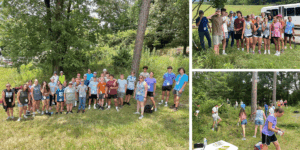
July 15, Lake Tomahawk Wildlife Garden Workday. Swannanoa Valley WILD! brought out a group of students with FUGE Camp to Lake Tomahawk in Black Mountain to help in the chapter’s effort to restore the wildlife gardens that surround the lake. The group was up for the challenge and worked for over two hours with seemingly endless energy and enthusiasm. We made huge progress with garden prep and invasive species removal as we prepare for the fall planting season. It takes an army of volunteers to restore habitat for wildlife. We are so thankful for everyone who has reached out to the chapter looking to engage with our projects and programs. More to come!
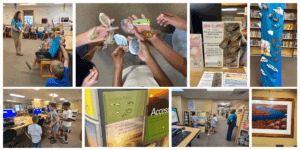
July 15, Wildlife Mimicry Program: In partnership with Pocosin Lakes NWR, NCWF participated in Tyrrell County Library’s summer reading program with a wildlife mimicry program. Families learned about local wildlife species that utilize mimicry and camouflage and participated in a fun scavenger hunt around the library where they had to find 8 camouflage species!
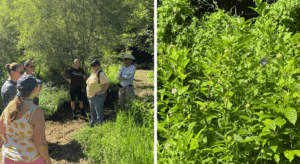
July 19, UCWC Naturalist Walk: NCWF Union County Wildlife Chapter led a group of nature enthusiasts on a guided naturalist walk along the Dogwood Park Nature Trail in Wesley Chapel. Led by Environmental Educator Breanna Walker, the group explored upland and stream habitats along the trail, searching high and low for critters, native plants, and other treasures along the way.
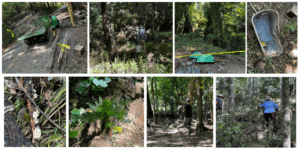
July 19, Tri-County Bolin Creek Clean Up: NCWF Tri-County Conservationists Chapter held a clean up along the Bolin Creek Greenway following Tropical Storm Chantel. Volunteers helped remove trash along the creek, including plant cages installed early last spring to protect newly planted native trees and shrubs. Some plants survived both in and out of their deer cages (including a number of small bald cypress), but unfortunately so did the privet. Stay tuned for upcoming invasive removal workdays along Bolin Creek to help clean up this area!
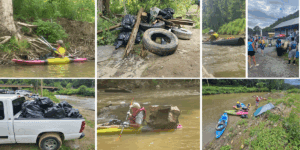
July 19, New River Clean Up. New River Conservancy, River Girl Fishing Company, and NCWF’s High Country Wild got together for a clean-up and debris removal on the New River in Todd starting at River Girl Fishing Company down to Todd Island Park. Trash and debris in waterways create a host of problems for wildlife including entanglement, ingestion, habitat contamination, and degraded water quality. Cleanup efforts like this one are vital in keeping our waterways clean and maintaining suitable habitat for wildlife. The crew removed a thousand pounds of debris from the river!

July 21, HAWK Wildlife Trivia: NCWF Habitat and Wildlife Keepers Chapter continued their tradition of wildlife trivia on the third Monday of each month at 6 Grogs neighborhood game bar in Matthews. This month, 9 teams competed for prizes. Fun was had by all involved!
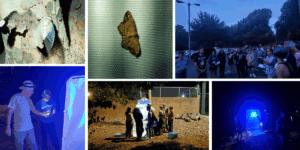
July 21, CWS Moth Night Out: NCWF Charlotte Wildlife Stewards chapter teamed up with the City of Charlotte Landscape Management to host Moth Night Out, a celebration of National Moth Week. Over 30 nature enthusiasts showed up for the opportunity to connect with our night-flying pollinators. For many, it was their first time! Participants learned how to attract moths with black lights, porch lights, and moth bait. Folks created moth art and observed many other insects, including caddis flies, beetles, and newly emerging cicadas. Shout out to naturalist Ken Kneidel and City Arborist Laurie Reid for their support of this event!
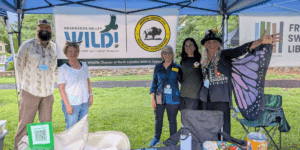
July 22, Groovin on Grovemont. Swannanoa Valley WILD! participated in the Groovin on Grovemont concert series in Swannanoa. The chapter spread the word to the community about various chapter projects in Swannanoa and different ways for folks to get involved.
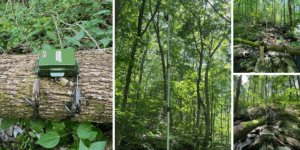
July 24, Pisgah Bat Survey. NCWF is partnering with the National Parks Conservation Association to operate a bat survey project focused on the last remaining patches of old-growth forests and maturing second-growth forests within the Craggy Mountains – a 16,000 acre portion of Pisgah National Forest where presence of bat species on the Species of Greatest Conservation Need list is largely unknown. Our collective goal is to fill area-specific knowledge gaps to provide best available information for future decision making in forest management and conservation efforts.
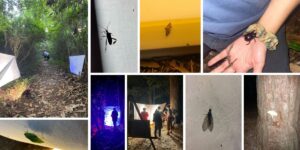
July 25, Moth Night: NCWF and Carolina Beach State Park Rangers collaborated to host a moth night at CBSP in celebration of National Moth Week! Participants observed dozens of species gathering at LED, black lights, wine ropes, and fermented fruit baits. Moths (Luna, Olive Arta, Orange Panopoda, Yellow-Spotted Webworm), Plant hoppers, Leaf-footed bugs, Cockroaches, Katydids, Wasps, Smooth Ox Beetles, Honey Bees, Fishflies, and Bats (Eastern Red, Tricolored, Evening, Seminole) were recorded by a crowd of 40 participants.
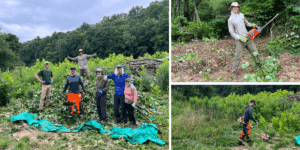
July 25, Bowditch Bottoms Invasive Species Removal. NCWF and Southern Appalachian Highlands Conservancy joined forces once again to tackle invasive plant species at Bowditch Bottoms in Yancey County. The crew has already removed the majority of the multiflora rose and autumn olive in one of the wetland areas with the goal of replanting with native wetland species in the fall and over the course of the next few years. On this workday, we directed our focus toward the Japanese knotweed growing along the creek on the property. Knotweed is a highly successful invasive plant of wetlands, stream corridors, forest edges, and drainage ditches across the country. Fortunately, we caught it early enough at Bowditch Bottoms and are confident that we’ll be able to manage its spread. Big thanks to all the volunteers who helped with this effort! More work days are being planned, so stay tuned for opportunities to volunteer at Bowditch Bottoms and learn about the project and the partnership!
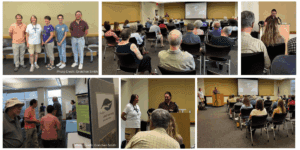
July 26, Tri-County Wildlife Wonder Presentation: NCWF Tri-County Conservationists Chapter, Friends of Lower Haw, and the Chatham Community Library partnered for a presentation about ethical wildlife photography. NCWF Creative Content Manager, Bates Whitaker, spoke to a group of over 40 people about why we take nature photos and the importance of taking these photos, especially wildlife photos, ethically. He also covered options for photography gear and equipment (hint: all you need is your smartphone) and gave a few tips and tricks for taking the best photos of wildlife.
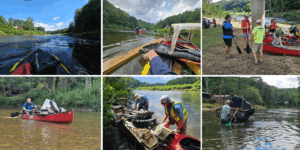
July 26, South Fork of the New Cleanup. New River Conservancy, Keep Ashe Beautiful, and NCWF’s High Country Wild got together for a clean-up and debris removal on the South Fork of the New River in Ashe County. Trash and debris in waterways create a host of problems for wildlife including entanglement, ingestion, habitat contamination, and degraded water quality. Cleanup efforts like this one are vital in keeping our waterways clean and maintaining suitable habitat for wildlife. The mighty volunteer crew removed 2,500 pounds of debris from the river!
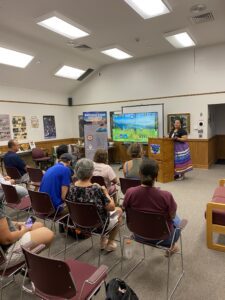
July 26, Waccamaw Siouan STEM Studio: The Friends of Lake Waccamaw State Park hosted Ashley Lomboy, Director of the Waccamaw Siouan STEM Studio, for a presentation on the program’s impact and plans for the upcoming year. The STEM Studio has a national reputation for a multigenerational approach that reinvests in the tribes they serve. Volunteers are wanted for tutoring, annual events (Yaccume fish camp, STEM day), and prescribed burn crew.
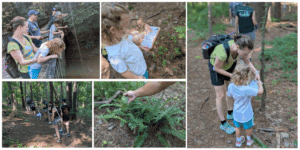
July 26, Eco Kids Scavenger Hunt: NCWF South Wake Conservationists Chapter held an Eco Kids Scavenger Hunt at Lake Johnson Park in Raleigh. Led by chapter leader and retired teacher, Cissy McKissick, kids and their families meandered through the woods, checking off wildlife and nature items along the way. The group observed spider webs, mushrooms, ferns, centipedes, deer, and turtles along the trail and by the water.
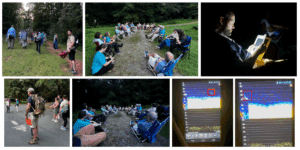
July 26, Triad Wild! Bat Night: NCWF Triad Wild! Chapter hosted Bat Night at Haw River State Park. Led by Duke Energy Natural Resources Manager, Scott Fletcher, the night began with a “batty” quiz as the sun set. Once it was dark, participants used a thermal scope to look for bats and other critters (including moths) in the sky and trees. Participants also used an echometer to listen for bats, observing their “j-shaped” calls on the echometer. These marks help to identify the species of bat based on the frequency of the call. The group saw and heard a number of different bat species including Big Brown bats and Eastern Red bats.
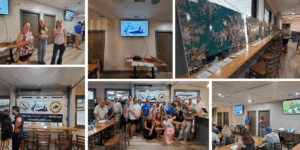
July 28, LNWC Island Habitat Social: Lake enthusiasts met at Lake Norman Brewery to learn more about the NCWF Lake Norman Wildlife Conservationists Island Habitat Program. The Island Habitat Program is a local initiative aimed at cleaning up, restoring, and protecting the 70+ islands on Lake Norman. Folks enjoyed fellowship, studied maps of the lake, and met with program coordinators and current island adopters. Several new folks even signed up to adopt islands during the social!
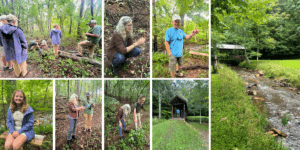
July 28th, High Country Wild Meeting & Nature Walk. High Country Wild is one of NCWF’s newest Community Wildlife Chapters. The chapter protects, conserves, and restores wildlife and habitat in Ashe and Watauga County. The chapter brings the local community together with opportunities to restore habitat, connect with nature, and learn about important wildlife and habitat topics in the region. The chapter got together to discuss upcoming projects and let everyone know about different ways to get involved! Afterwards, the group took a leisurely nature walk searching for birds, mammals, salamanders, fungi, native plants, and more.
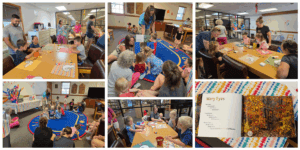
July 29, Camouflaged Critters: In partnership with Pocosin Lakes NWR, NCWF provided a fun camouflage lesson to our youngest future conservationists at Tyrrell County Library where participants enjoyed detecting the hidden wildlife on the pages of a book about camouflage. Afterward, they got creative with a camouflage craft!
Written by:

– Page Turner, Conservation Coordinator
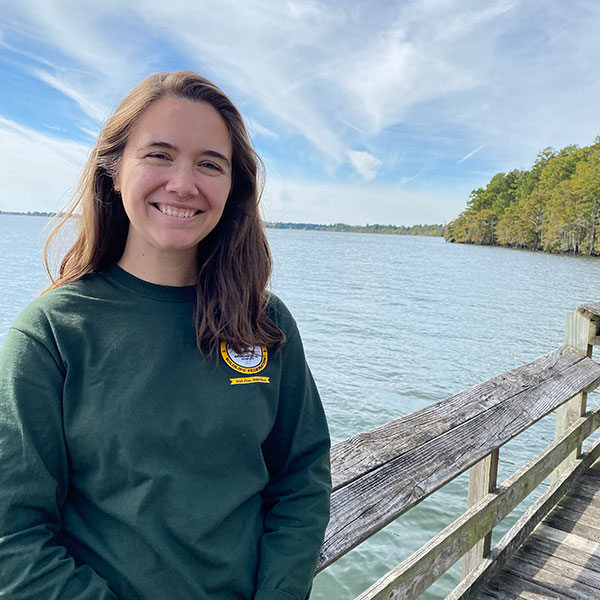
– Laura Frazier, Refuge Conservation Coordinator
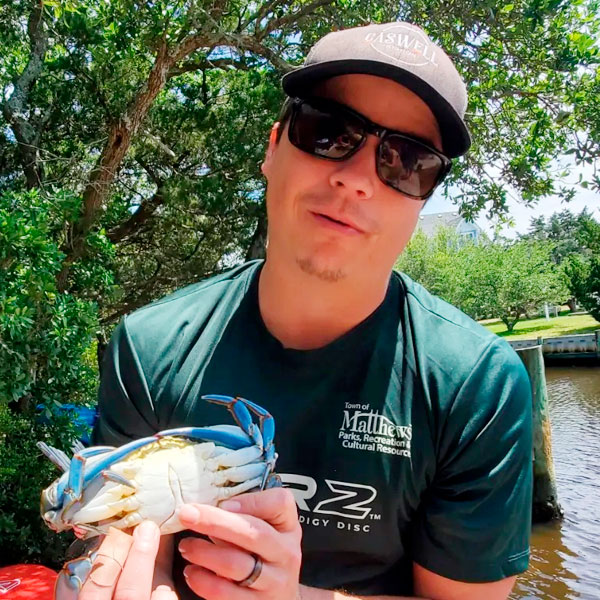
– Alden Picard, Conservation Coordinator
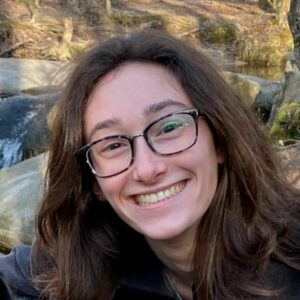
– Kara Solomon, Conservation Coordinator

– Luke Bennett, NCWF Conservation Coordinator

